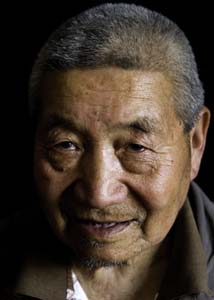Name: Kunchok Tsewang
(Alias: No)
Gender: Male
Interview Age: 78
Date of Birth: 1935
Birthplace: Tsari, Utsang, Tibet
Year Left Tibet: 1960
Profession: Nomad
Monk/Nun: No
Political Prisoner: No

Interview No.: 12D
Date: 2012-05-16
Language: Tibetan
Location: Mcleod Ganj, Dharamsala, Himachal Pradesh, India
Categories: Culture and History
Keywords: childhood memories, children's games, Chinese rule -- life under, escape experiences, myths/stories, nomadic life, pilgrimage, refugee in India -- life as, thamzing/struggle sessions, Utsang
Summary:
Kunchok Tsewang is from Tsari, which he describes as a pilgrimage site. He hails from a nomadic background and started herding animals at the age of 5 or 6. He enjoyed riding horses and shares his experience about the various types of horses and types of saddles. He also liked playing with knives and slingshots with other boys in the forest.
Kunchok Tsewang explains that Tsari was a region where cultivation was forbidden because of the many holy mountains called lari and lakes known as lamtso that were dedicated to His Holiness the Dalai Lama, the Panchen Lama and other high lamas. He also talks about tsikor, bakor and rongkor, the three types of circumambulations performed during special times of the year at a sacred mountain called the nayri 'pilgrim mountain.' He speaks about the migoe 'ape/gorilla/yeti' whose huge and wet footprints he saw in the forests of his region.
Kunchok Tsewang notes that the Chinese first appeared when he was around 15 or 16 years. He describes the suffering Tibetan people endured such as thamzing 'struggle session,' imprisonment and torture under the Chinese. Kunchok Tewang and his father fled to India after learning that the Chinese were going to subject his father to thamzing. They witnessed the death of many other refugees who could not survive the harsh climate in India.
Interview Team:
- Rebecca Novick (Interviewer)
- Ronny Novick (Videographer)
- Thupten Kelsang Dakpa (Interpreter)

